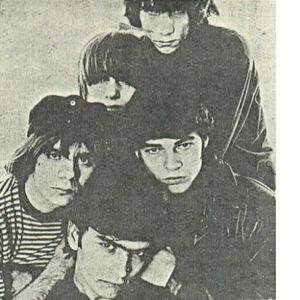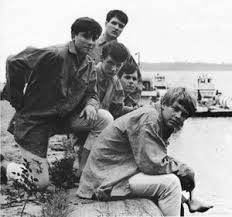Garage rock is a raw and energetic style of rock and roll that flourished in the mid-1960s, most notably in the United States and Canada, and has experienced a series of subsequent revivals. The style is characterized by basic chord structures played on electric guitars and other instruments, sometimes distorted through a fuzzbox, as well as often unsophisticated and occasionally aggressive lyrics and delivery. Its name derives from the perception that groups were often made up of young amateurs who rehearsed in the family garage, although many were professional.
Acid rock is a loosely defined type of rock music that evolved out of the mid-1960s garage punk movement and helped launch the psychedelic subculture. The term is sometimes used interchangeably with "psychedelic rock", but it also specifically refers to a more musically intense subgenre or sibling of the psychedelic rock style. Named after lysergic acid diethylamide (LSD), the style is generally defined by heavy, distorted guitars, lyrics with drug references, and long improvised jams.

James Thomas Ramey, better known as Baby Huey, was an American singer. He was the frontman for the band Baby Huey & the Babysitters, whose sole LP for Curtom Records in 1971 was influential in the development of hip hop music.

The Music Machine was an American rock band formed in Los Angeles, California in 1966. Fronted by chief songwriter and lead vocalist Sean Bonniwell, the band cultivated a characteristically dark and rebellious image reflected in an untamed musical approach. Sometimes it made use of distorted guitar lines and hallucinogenic organ parts, punctuated by Bonniwell's distinctively throaty vocals. Although they managed to attain national chart success only briefly with two singles, the Music Machine is today considered by many critics to be one of the groundbreaking acts of the 1960s. Their style is now recognized as a pioneering force in proto-punk; yet within a relatively short period of time, they began to employ more complex lyrical and instrumental arrangements that went beyond the typical garage band format.
The Magic Mushrooms were an American psychedelic garage rock band in the 1960s. The Magic Mushrooms were originally composed of five students from the University of Pennsylvania in Philadelphia. They were:

Love, Peace & Poetry – Vol.3 Asian is the third volume in the Love, Peace & Poetry series released by QDK Media and Normal Records in 2000. This volume explores obscuro garage rock and psychedelic rock bands from Asia, specifically from Hong Kong, Turkey, Korea, Japan, Cambodia, India and Singapore.

Pebbles is an extensive series of compilation albums in both LP and CD formats that have been issued on several record labels, though mostly by AIP. Together with the companion Highs in the Mid-Sixties series, the Pebbles series made available over 800 obscure, mostly American "Original Punk Rock" songs recorded in the mid-1960s — primarily known today as the garage rock and psychedelic rock genres — that were previously known only to a handful of collectors. In 2007, the release of the Pebbles, Volume 11: Northern California CD marked the final album in the Pebbles series. The following year, Bomp! marked the 30th anniversary of the original Pebbles album with a spartan, limited-edition, clear-vinyl reissue complete with the original pink cover insert.
Mouse and the Traps is the name of an American garage rock band from Tyler, Texas, United States, that released numerous singles between 1965 and 1969, two of which, "A Public Execution" and "Sometimes You Just Can't Win", became large regional hits. The leader of the band, nicknamed "Mouse", was Ronny Weiss. Two of their best known songs, "A Public Execution" and a cover of "Psychotic Reaction", are not actually credited to this band but, respectively, to simply Mouse and Positively 13 O'Clock instead. Their tangled history also included one single that was released anonymously under the name Chris St. John. The band are not to be confused with the girl group Mousie and The Traps who recorded for Toddlin' Town records around the same time.
Garage punk is a rock music fusion genre combining the influences of garage rock, punk rock, and often other genres, that took shape in the indie rock underground between the late 1980s and early 1990s. Bands drew heavily from 1960s garage rock, stripped-down 1970s punk rock, and Detroit proto-punk, and often incorporated numerous other styles into their approach, such as power pop, 1960s girl groups, hardcore punk, blues and early R&B, and surf rock.
Velvett Fogg were a British psychedelic rock band. Tony Iommi was a member in mid-1968, but soon left to form Black Sabbath. Their lone eponymous album was released in January 1969, and re-released on CD by Sanctuary Records in 2002.
The Sting-rays were a British rock band from Greater London which recorded on Ace Records' garage and psychedelic subsidiary Big Beat and Joe Foster's Kaleidoscope Sound in the 1980s.

Garage Beat '66! is a series of garage rock compilation albums issued by Sundazed Records. The series currently consists of seven CDs, each of which is officially designated by its volume number, which appears in the upper left-hand corner of the front cover, and a corresponding "catch phrase" title, which appears as a subheading under the large Garage Beat '66 logo below. The Garage Beat '66 series attempts to represent the breadth and variety of the genre, including not only rawer hard-rocking numbers, but also songs displaying folk rock and psychedelic influence, as well as pop. All of the currently existing installments were released between 2004 and 2007. The series is recognized for good sound quality: all of the song selections were mastered from the original studio source elements. All of the volumes follow the packaging format employed by other garage compilation series such as Pebbles. Each volume includes detailed and fully researched liner notes, which include biographical sketches about each song and group, as well as other information such as origin and recording date, as well as photographs of the bands.

The Liberty Bell was an American garage rock/psychedelic rock band from Corpus Christi, Texas who were active in the 1960s. They specialized in a blues-based brand of proto-punk influenced by British groups such as the Yardbirds. The band failed to reach wider audience in the time, but have come to the attention of garage rock collectors and enthusiasts in the intervening years since their breakup, with their work appearing on several compilations.

The Groupies were an American garage rock-psychedelic rock band from New York City who were active in the 1960s and are known for an innovative approach to primal blues-based rock exemplified in such songs as "Primitive". They were a popular fixture in the New York club scene and recorded for Atco Records, later venturing to Los Angeles. Due to their uncompromising stance the Groupies failed to attract a wider audience outside of their local enclaves. They have come to the attention of garage rock and psychedelic enthusiasts and their work has been included on various compilations such as the 1998 Nuggets four-CD box set, which was released on Rhino Records. Their material has been re-issued on other garage rock and psychedelic compilations such as the Pebbles, Volume 10 LP.

Lawson and Four More were an American garage rock/psychedelic rock band from Memphis, Tennessee, who were active in the 1960s. The group was led by Bobby Lawson and was known for their hard, blues-based sound which, as they evolved, increasingly incorporated esoteric psychedelic elements. The group regularly worked with musician, songwriter, and producer Jim Dickinson and cut the first rock release for Memphis label, Ardent Records. As a side-project, they briefly recorded under the name The Avengers, as a Batman-themed takeoff group in 1966.

Psychedelic funk is a music genre that combines funk music with elements of psychedelic rock. It was pioneered in the late 1960s and early 1970s by American acts like Sly and the Family Stone, Jimi Hendrix, and the Parliament-Funkadelic collective. It would influence subsequent styles including '70s jazz fusion and the '90s West Coast hip hop style G-funk.
She was an all-female American garage rock band from Sacramento, California that was active between 1964 and 1971. Originally called the Id, the band later changed its name to the Hairem, where its members recorded several tracks that remained unissued for many years. Though the group was known for a raw sound, as the decade passed they incorporated psychedelic influences and eventually changed their name to She. In 1970, as She, they released the single, "Boy Little Boy" b/w "Outta Reach". Since 1999, with the release of the She Wants a Piece of You compilation, the group's work has come to the attention of garage rock enthusiasts.
Atomic Forest was an Indian psychedelic and hard rock band from Mumbai, active in the early-1970s. They recorded a single album, Obsession '77.









